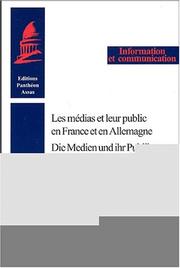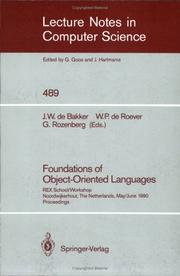| Listing 1 - 10 of 10 |
Sort by
|
Book
ISBN: 0791807479 Year: 1991 Publisher: New York (N.Y.): American society of mechanical engineers
Abstract | Keywords | Export | Availability | Bookmark
 Loading...
Loading...Choose an application
- Reference Manager
- EndNote
- RefWorks (Direct export to RefWorks)
Design, Industrial --- -Engineering design --- -Congresses --- Congressses
Book
Publisher: [s.l.] : [s.n.],
Abstract | Keywords | Export | Availability | Bookmark
 Loading...
Loading...Choose an application
- Reference Manager
- EndNote
- RefWorks (Direct export to RefWorks)
Abused children --- Enfants maltraités --- Congressses --- Congrès

ISBN: 291339714X 9782913397149 Year: 2003 Volume: *2 Publisher: Paris : Panthéon-Assas,
Abstract | Keywords | Export | Availability | Bookmark
 Loading...
Loading...Choose an application
- Reference Manager
- EndNote
- RefWorks (Direct export to RefWorks)
Mass communications --- Germany --- France --- Mass media --- Médias --- Audiences --- Congressses --- Congresses --- Publics --- Congrès --- Médias --- Congrès --- Congressses. --- Congresses. --- Études transculturelles --- Allemagne
Book
ISBN: 9782130606314 2130606318 Year: 2013 Publisher: Paris : Presses universitaires de France,
Abstract | Keywords | Export | Availability | Bookmark
 Loading...
Loading...Choose an application
- Reference Manager
- EndNote
- RefWorks (Direct export to RefWorks)
Cet ouvrage prend au sérieux le concept de "société du risque" d'Ulrich Beck (1986) et s'interroge sur ce que nous avons appris depuis les années 1980. Quelle est la réalité des changements qui ont eu cours dans les années 1970-80 ? A-t-on assisté à une montée générale des incertitudes liées au processus de modernisation, à une prise de conscience collective de la vulnérabilité des sociétés contemporaines, ou au passage d'une société du progrès à une société du risque où l'on sait le caractère fondamentalement ambivalent des changements scientifiques et techniques ? Si ces années ont été celles d'une prise de conscience des dégâts du "progrès", comment expliquer le tournant néolibéral qui l'ont accompagnée et dont les effets dévastateurs se déroulent sous nos yeux ? Les questions abordées sont également réflexives. Que peut-on dire de l'emprise de la notion de risque en sciences sociales, des approches qu'elle a permises, des objets qu'elle a rendus visibles. Mais aussi des objets qu'elle contribue à invisibiliser. Les "nouveaux risques" ne masquent-ils pas des risques plus anciens comme les risques sociaux ? Quelle est la politique de la connaissance liée au concept de société du risque ? La notion de risques a-t-elle ouvert de nouveaux horizons et lesquels ?
Risk --- Risk assessment --- Risk management --- Risque --- Evaluation du risque --- Gestion du risque --- Social aspects --- Sociological aspects --- Aspect social --- Aspect sociologique --- Sociologie du risque --- Perception du risque --- Sociologie --- Risk - Social aspects - Congressses --- Risk - Sociological aspects - Congressses --- Risk assessment - Congressses --- Risk management - Congressses
Book
ISBN: 9783631666357 Year: 2016 Publisher: New York : Peter Lang,
Abstract | Keywords | Export | Availability | Bookmark
 Loading...
Loading...Choose an application
- Reference Manager
- EndNote
- RefWorks (Direct export to RefWorks)
Adult education --- Continuing education --- Education des adultes --- Education permanente --- Cross-cultural studies --- Congresses --- Congressses --- Etudes transculturelles --- Congrès
Book
ISBN: 9782953821666 295382166X Year: 2013 Volume: 18 Publisher: Villeneuve d'Ascq Revue du Nord
Abstract | Keywords | Export | Availability | Bookmark
 Loading...
Loading...Choose an application
- Reference Manager
- EndNote
- RefWorks (Direct export to RefWorks)
Agriculture. --- Land use. --- Land use, Rural. --- Land use --- Land use, Rural --- Waste lands --- Agriculture --- Utilisation du sol --- Utilisation agricole du sol --- History --- Congresses --- Congresses. --- Histoire --- Congrès --- Moors (Wetlands) --- Marshes --- Open spaces --- Friches --- Landes --- Marais --- Espaces verts --- Congresse --- Congressses --- Congrès --- Congressses. --- Espaces naturels --- Acte de congrès. --- Gestion
Book
Year: 2006 Publisher: Sankt-Peterburg : Pushkinskiĭ proekt,
Abstract | Keywords | Export | Availability | Bookmark
 Loading...
Loading...Choose an application
- Reference Manager
- EndNote
- RefWorks (Direct export to RefWorks)
Russian literature --- Chance in literature --- Littérature russe --- Hasard dans la littérature --- History and criticism --- Congresses --- Congressses --- Histoire et critique --- Congrès --- Congrès --- Pushkin, Aleksandr Sergeevich, --- Congresses.
Book
ISBN: 9788871407265 8871407261 Year: 2016 Publisher: Roma : Institutum Romanum Finlandiae,
Abstract | Keywords | Export | Availability | Bookmark
 Loading...
Loading...Choose an application
- Reference Manager
- EndNote
- RefWorks (Direct export to RefWorks)
Women --- Women's rights --- Marriage --- Economic history --- Home economics --- Femmes --- Mariage --- Histoire économique --- Economie domestique --- History --- Congresses. --- Economic conditions --- Congresses --- Congressses --- Economic aspects --- Histoire --- Congrès --- Conditions économiques --- Droits --- Aspect économique --- Économie domestique --- Actes de congrès --- Conditions sociales --- Human females --- Wimmin --- Woman --- Womon --- Womyn --- Females --- Human beings --- Femininity --- Conferences - Meetings --- E-books

ISBN: 354053931X 038753931X 3540464506 Year: 1991 Volume: vol 489 Publisher: Berlin Springer
Abstract | Keywords | Export | Availability | Bookmark
 Loading...
Loading...Choose an application
- Reference Manager
- EndNote
- RefWorks (Direct export to RefWorks)
Over the last few years, object-oriented programming has been recognized as the best way currently available of structuring software systems. It emphasizes grouping together data and the operations performed on them, encapsulating the whole behind a clean interface, and organizing the resulting entities in a hierarchy based on specialization in functionality. In this way it provides excellent support for the construction of large systems. Up to now, there has been relatively little effort to develop formal theories of object-oriented programming. However, for the field to mature, a more formal understanding of the basic concepts of object-oriented programming is necessary. This volume presents the proceedings of the School/Workshop on Foundations of Object-Oriented Programming (FOOL) held in Noordwijkerhout, The Netherlands, May 28 - June 1, 1990. The workshop was an activity of the project REX (Research and Education in Concurrent Systems).
Programming --- Programming languages (Electronic computers) --- -Object-oriented programming (Computer science) --- -681.3*D20 --- Computer programming --- Object-oriented methods (Computer science) --- Document Object Model (Web site development technology) --- Congresses --- Case studies --- Computerwetenschap--?*D20 --- Object-oriented programming languages --- 681.3*D20 --- Object-oriented languages (Computer program languages) --- OO languages (Computer program languages) --- OOLs (Computer program languages) --- OOP languages (Computer program languages) --- Object-oriented programming (Computer science) --- Object-oriented programming (Computer science) - Congressses. --- Programming languages (Electronic computers) - Congresses. --- Computer science. --- Software engineering. --- Logic design. --- Programming Languages, Compilers, Interpreters. --- Programming Techniques. --- Software Engineering. --- Logics and Meanings of Programs. --- Design, Logic --- Design of logic systems --- Digital electronics --- Electronic circuit design --- Logic circuits --- Machine theory --- Switching theory --- Computer software engineering --- Engineering --- Informatics --- Science --- Language pool --- Lotos
Book
ISBN: 9289012676 Year: 1986 Volume: 101 Publisher: Copenhagen WHO
Abstract | Keywords | Export | Availability | Bookmark
 Loading...
Loading...Choose an application
- Reference Manager
- EndNote
- RefWorks (Direct export to RefWorks)
Divorce --- Child Psychology --- Children of divorced parents --- Broken homes --- Children --- Enfants de divorcés --- Foyers brisés --- Enfants --- Mental health --- Services for --- Santé mentale --- Services --- Parent-Child Relations. --- Divorce. --- Family. --- -Children --- -Childhood --- Kids (Children) --- Pedology (Child study) --- Youngsters --- Age groups --- Families --- Life cycle, Human --- Homes, Broken --- Home --- Extended Family --- Family Life Cycle --- Family Research --- Filiation --- Kinship Networks --- Relatives --- Family Life Cycles --- Family Members --- Family, Reconstituted --- Stepfamily --- Extended Families --- Families, Extended --- Families, Reconstituted --- Family Member --- Family, Extended --- Kinship Network --- Life Cycle, Family --- Life Cycles, Family --- Network, Kinship --- Networks, Kinship --- Reconstituted Families --- Reconstituted Family --- Research, Family --- Stepfamilies --- Grandparents --- Divorced --- Separated --- Separation --- Divorces --- Separations --- Congresses --- -Congressses --- -Congresses --- Psychology, Child. --- Enfants de divorcés --- Foyers brisés --- Santé mentale --- Family --- Parent-Child Relations --- Childhood --- Divorced parents' children --- Divorced parents --- Adult children of divorced parents --- Children of single parents --- Parent Child Relationship --- Parent-Child Relationship --- Child Relationship, Parent --- Child Relationships, Parent --- Parent Child Relations --- Parent Child Relationships --- Parent-Child Relation --- Parent-Child Relationships --- Relation, Parent-Child --- Relations, Parent-Child --- Relationship, Parent Child --- Relationship, Parent-Child --- Relationships, Parent Child --- Relationships, Parent-Child --- Mental health&delete& --- Services for&delete& --- Parent-Offspring Interaction --- Interaction, Parent-Offspring --- Parent Offspring Interaction --- Parent-Offspring Interactions
| Listing 1 - 10 of 10 |
Sort by
|

 Search
Search Feedback
Feedback About UniCat
About UniCat  Help
Help News
News